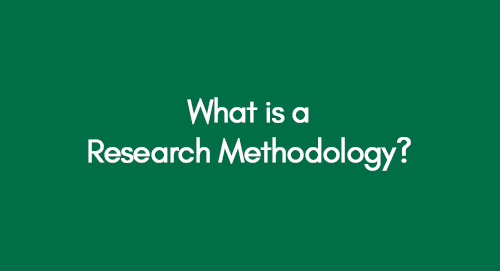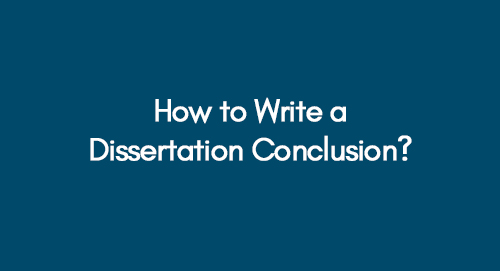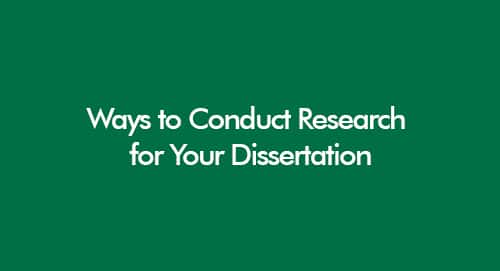
Methodology
July 28, 2022
How to Write a Dissertation Methodology? A Guideline
August 2, 2022The conclusion is the final section of a dissertation, summarizing research findings, validating new propositions, and posing unanswered questions. It should showcase familiarity with the field's research, aiding a quick understanding of the work's essence without delving into the methodology.
Explore More About Writing Conclusions for Your Dissertations Here
References follow the conclusion, formatted according to national bibliography standards. Evaluation of the research's significance typically occurs at the organization or institution where it was conducted, with conclusions provided within two to three months of review, overseen by the supervisor for quality and objectivity. Discover the key steps and expert insights on how to write a dissertation conclusion that seals your research with a compelling and memorable finish in our latest blog post.
How is a Conclusion in a Dissertation Different From a Discussion?
Here is how:
Discussion vs Conclusion
Every dissertation or essay should have a discussion and a conclusion. Dissertations usually leave these for the end. Furthermore, recommendations or implications for future research are included. A dissertation's conclusion and discussion sections are often considered interchangeable. This article aims to demonstrate the difference between discussion and conclusion.
Discussion
In a discussion, the subject or hypothesis is reviewed. Discussions cover the major points of an essay, which are then analyzed in detail to explain them. In a discussion, the results obtained in an experiment are described and compared with those obtained in other experiments. The purpose of the discussion is to reflect upon the results and methodology used during the experiment and suggest possible errors. Discussions often take into account other people's opinions on the same subject.
Find More Information in the Discussion Section of Your Research
Conclusion
In the final section of a dissertation, the main points are summarized once again before the essay is concluded. Creating a dramatic effect on the reader is the goal of a conclusion by summarizing all the main points. To leave a lasting impression on the minds of audiences, a conclusion is like the climax of a performance or film. A writer should do his best to summarize the main points of the essay in an effective manner in the conclusion, as it is often the conclusion that remains in the reader's memory.
- Conclusions are merely summaries of a dissertation, while discussions can be judgmental.
- In conclusion, a writer summarizes the position they have taken while he analyzes that position in the discussion.
- A discussion considers other points, while a conclusion focuses on summarizing the main points concisely.
What are the Ingredients of a Conclusion in a Dissertation?
Summary is the primary component of the dissertation conclusion. In addition to these elements, it can also contain preconceived notions, preconceived arguments, and research methods. It takes a lot of expertise to put all these facts together in a neat little summary; that is where we come in.
A conclusion will be presented as a summary of the information and knowledge obtained from the research. Although the dissertation has some limitations regarding contribution and research, these are also mentioned in the conclusion.
It is also important to discuss the speculation surrounding that limitation and its implications in the conclusion. Aside from summarizing the research, the conclusion also discusses the field's future directions.
Having alternative data available can greatly enhance dissertation writing. This alternative data could include Data from other fields in the form of elaborate findings. The piece can also include additional data.
Conclusion Length
Depending on the type, conclusions should typically be between 5 and 7% of the overall dissertation word count. Humanities dissertations may require more space to wrap up their analysis and tie all the chapters together in a coherent argument, whereas empirical scientific studies often have a summary of their main findings and recommendations.
The Process of Writing a Conclusion: How to Write a Perfect One?
Conclusions are the last sections of your dissertation. The goal of the dissertation conclusion is to answer the main question of the research, summarize the research, recommend possible future research on the subject, and list the new information the research provides.
It is important to remember that while the discussion and the conclusion contain similar elements, they are not the same, as we discussed earlier. Papers and journal articles may not have both of these sections in a single write-up. However, conclusions and discussions must be included in a thesis.
Conclusions summarize all of your research's key points, while discussions provide specific interpretations and results.
Step 1: Answer the Primary Research Question
Understanding how to begin a conclusion is the first step. Your dissertation's key question must be at the beginning. By doing this, you will be able to show what you have accomplished. A clear and concise statement is required. The results discussed in the thesis do not need to be repeated. The final takeaway for readers will be a few words combining them.
Step 2: Summaries Your Research
During the conclusion of your thesis, you remind your readers why you chose a certain approach to a topic. Results that met your expectations and those that did not must be summarized.
There should not be a lot of repetition in the summary. Not every chapter will be summarized. Rather, it should reflect the views and ideas you developed in your thesis. You can also mention any research limitations here. The methodology you used should also be suited to the topic discussed.
Step 3: Offer Recommendations
As you discussed your research, you may have suggested possible areas for future research. You can, however, elaborate on these recommendations in the conclusion. Ensure that all your findings have implications for your field.
Step 4: Emphasize the Contributions of Your Research
It is a good thesis when it contributes new knowledge to its field. You are giving your readers an impression of the contribution of your thesis in this way. Different ways can be used to emphasize your research's contributions:
- Describe how your thesis has helped solve the problem stated in the problem statement
- Make sure your research addresses any gaps in knowledge in the literature review by citing references
- Describe how your results challenge existing theories and assumptions
It is important to avoid repeating information that has already been discussed. Provide a brief overview of the most important points.
Step 5: Close Your Dissertation
Finally, you are near the end of writing your thesis. Since everything is still clear and fresh in my mind, it is the perfect time to hit the final steps. Comparing your conclusion with another top example of a thesis conclusion is also a good idea. Making your conclusion look better is the goal. You need to focus on the following:
- The abstract. Make sure to write an appealing one because this is the part that will be first read from your dissertation. It will also decide if the dissertation is worth a read.
- A list of references.
- The appendices.
- Do not forget to proofread your paper.
Get a Dissertation Proposal – Get Going!
Dissertation Proposal Lays Down the Outline of Your Final Dissertation
Get a Dissertation Proposal that matches your requirements, which includes the topic title, research aim and objective, research questions, research gap, literature review, methodology and list of reference papers.
The Dissertation Proposal will be foundation of your final dissertation. It is very important to get this done perfectly to avoid any problems!
Tips and Tricks for Writing an Appealing Conclusion
The concluding chapter should not be viewed as summarizing what you have already said. You should pay as much attention to your conclusion as to the rest of your dissertation. It should be rushed through because you have already said what needs to be said. A conclusion summarizes all the evidence you have presented and reminds the reader of the arguments you have advanced to support your thesis. Describe how your evidence leads you to make deductions.
Ensure you do not think that neat rounding-offs are only required at the end of your dissertation. Before you can move on to your next chapter, each chapter needs to have its ends tied up, so if you cannot do it on your own, order dissertation writing help. Thus, the concluding chapter summarizes all the preceding chapters and presents your final verdict before bringing it all together.
Being interesting is equally important. It is possible that your reader will glaze over if you write a formulaic conclusion to your work. Let your passion guide you through the desire to give up and finally achieve your goals. Fear not - the end is near.
What makes a Good Conclusion?
- If your research led you to certain conclusions, perhaps you would like to discuss them.
- Describe how you felt limited during this process.
- A conclusion should contain a section summarizing your arguments and evidence rather than just a work summary. It is important to restate what has been said before, but not everything needs to be repeated.
- As a Master's dissertation, discuss how this research might be expanded if you pursue a PhD.
- The ending should be short compared to the rest of your work.
- You could also recommend further research on this subject - students who follow you may thank you since they often struggle to come up with a topic for their work, and they will reference your work.
- The conclusions you draw about your research must also be clearly explained.
You should not wander off in a completely different direction at the end of your work. That is all you need to know about dissertation conclusions.
FAQs about Dissertation Conclusions
In a discussion, the subject or hypothesis is reviewed. Discussions cover the major points of an essay, which are then analyzed in detail to explain them. In a discussion, the results obtained in an experiment are described and compared with those obtained in other experiments. The purpose of discussion is to reflect upon the results and methodology used during the experiment and suggest possible errors. Discussions often take into account other people's opinions on the same subject.
Conclusion
In the final section of a dissertation, the main points are summarized once again before the essay is concluded. Creating a dramatic effect on the reader is the goal of a conclusion by summarizing all the main points. A conclusion, unlike a discussion, is just the summary of your detailed work and does not entertain arguments.
Get 3+ Free Dissertation Topics within 24 hours?
>'{



























